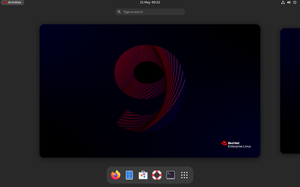m (Put the right reference in) |
m (fix spelling + rename display title) |
||
| (8 intermediate revisions by 4 users not shown) | |||
| Line 7: | Line 7: | ||
| releasemodel = Stable | | releasemodel = Stable | ||
| packagemanager = [[dnf]] | | packagemanager = [[dnf]] | ||
| defaultdesktops = GNOME | |||
| usagetype = Desktop, Server | | usagetype = Desktop, Server | ||
| architectures = aarch64, i386, ia64, IBM Z, ppc, ppc64el, s390, s390x, x86_64, x86-64-v2 | |||
| website = [https://redhat.com/rhel/ redhat.com] | | website = [https://redhat.com/rhel/ redhat.com] | ||
}} | }} | ||
Red Hat Enterprise Linux, commonly abbreviated as RHEL, is a commercial distribution developed by Red Hat for the enterprise market and the first version of RHEL was released on the February 22, 2000.<ref>[https://www.redhat.com/en/about/press-releases/red-hat-enterprise-edition-product-line-optimizes-solutions-top-e-business-applications Red Hat Enterprise Edition Product Line Optimizes Solutions for Top E-business Applications] Press release by Red Hat. Retrieved February 20, 2020.</ref> Red Hat profits from this distribution by providing 24/7 technical support to business | [[File:Red Hat Enterprise Linux 9 Workstation showing GNOME Shell 40.png|thumb|Red Hat Enterprise Linux 9.0 Workstation showing GNOME Shell 40]] | ||
'''Red Hat Enterprise Linux''', commonly abbreviated as RHEL, is a commercial [[Linux Distributions|Linux distribution]] developed by Red Hat for the enterprise market and the first version of RHEL was released on the February 22, 2000.<ref>[https://www.redhat.com/en/about/press-releases/red-hat-enterprise-edition-product-line-optimizes-solutions-top-e-business-applications Red Hat Enterprise Edition Product Line Optimizes Solutions for Top E-business Applications] Press release by Red Hat. Retrieved February 20, 2020.</ref> Red Hat profits from this distribution by providing 24/7 technical support to business customers.<ref>https://www.redhat.com/en/technologies/linux-platforms/enterprise-linux</ref> | |||
== Controversy == | == Controversy == | ||
Red Hat originally freely provided its source code, but restricted free re-distributions of the officially supported versions of RHEL. Derivative distributions such as Rocky Linux or Oracle Linux were able to be redistributed by removing Red Hat's trademarks. In 2023, Red Hat stopped publicly providing the source code for RHEL.<ref>[https://www.theregister.com/2023/06/23/red_hat_centos_move/ Red Hat strikes a crushing blow against RHEL downstreams] The Register. Retrieved 24 June 2023.</ref> However, it is still available to customers and developers under | Red Hat originally freely provided its source code, but restricted free re-distributions of the officially supported versions of RHEL. Derivative distributions such as Rocky Linux or Oracle Linux were able to be redistributed by removing Red Hat's trademarks. In 2023, Red Hat stopped publicly providing the source code for RHEL.<ref>[https://www.theregister.com/2023/06/23/red_hat_centos_move/ Red Hat strikes a crushing blow against RHEL downstreams] The Register. Retrieved 24 June 2023.</ref> However, it is still available to customers and developers under a Non Disclosure Agreement. | ||
<references /> | <references /> | ||
[[Category:Linux Distributions]] | [[Category:Linux Distributions]] | ||
Latest revision as of 18:38, 13 June 2024
Introduction
 Red Hat Enterprise Linux (RHEL) | |
| Release Status | Maintained |
|---|---|
| Release Model | Stable |
| Package Manager | dnf |
| Default Desktops | GNOME |
| Usage Type | Desktop, Server |
| Architectures | aarch64, i386, ia64, IBM Z, ppc, ppc64el, s390, s390x, x86_64, x86-64-v2 |
| Website | redhat.com |

Red Hat Enterprise Linux, commonly abbreviated as RHEL, is a commercial Linux distribution developed by Red Hat for the enterprise market and the first version of RHEL was released on the February 22, 2000.[1] Red Hat profits from this distribution by providing 24/7 technical support to business customers.[2]
Controversy
Red Hat originally freely provided its source code, but restricted free re-distributions of the officially supported versions of RHEL. Derivative distributions such as Rocky Linux or Oracle Linux were able to be redistributed by removing Red Hat's trademarks. In 2023, Red Hat stopped publicly providing the source code for RHEL.[3] However, it is still available to customers and developers under a Non Disclosure Agreement.
- ↑ Red Hat Enterprise Edition Product Line Optimizes Solutions for Top E-business Applications Press release by Red Hat. Retrieved February 20, 2020.
- ↑ https://www.redhat.com/en/technologies/linux-platforms/enterprise-linux
- ↑ Red Hat strikes a crushing blow against RHEL downstreams The Register. Retrieved 24 June 2023.
